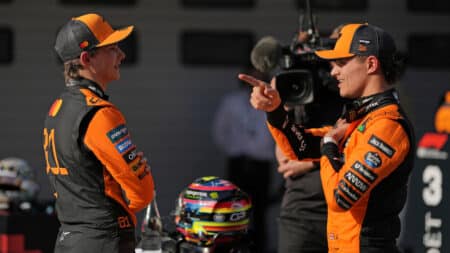
Norris must deal with Piastri's pace – or suffer Mark Webber's fate
As Oscar Piastri moved into the championship lead, his manager Mark Webber's example should serve as a warning to Lando Norris, says Mark Hughes
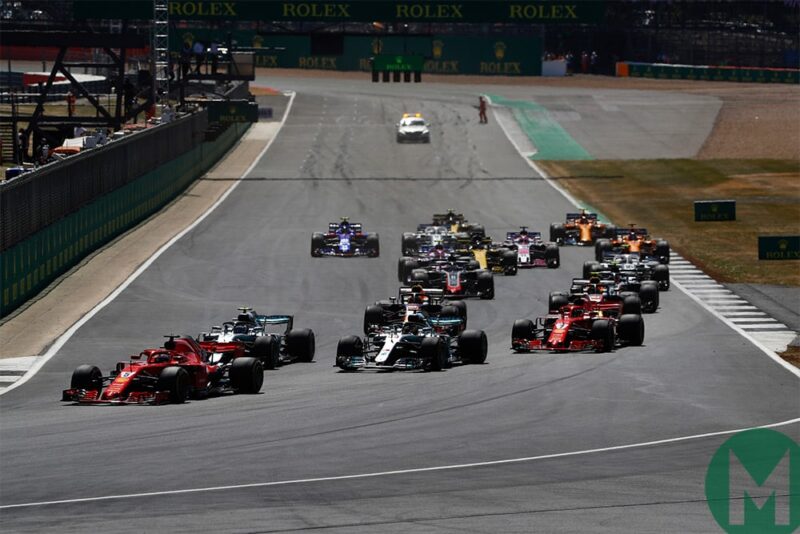
Motorsport Images
This was a close one, a battle royale between Ferrari and Mercedes around Silverstone’s flat-out sweeps on a scorching summer day. The two fastest Formula 1 cars of all time stretched their legs, straining their mechanical sinews and the outcome depended upon the smallest details, some of merit, others luck.
Sebastian Vettel won it – maybe with some help from a safety car – but the timing of it meant he had to grab the victory back off his race-long challenger Valtteri Bottas, whereas if it had just played out uninterrupted, his late race would have been a defensive rather than attacking one. He’d probably have won it anyway.
It was a superbly cool performance but Lewis Hamilton was understandably furious, with the turn of events after hanging it all out in qualifying to make himself the crucial differentiator that secured pole, only then for the Ferrari’s long-superior start-line performance to lose him that advantage within seconds. This, in, turn exposing him to a brake-locking attack into Village from Kimi Räikkönen that had the crowd’s hero facing the wrong way and at the back before the race had barely begun.
Being Hamilton, he, of course, made a great recovery drive – taking second from his tyre-fading team-mate with a few laps to go. And he, of course, made a meal of the injustice of it all and was suspicious about what was actually a totally logical strategy call at the safety car.
The showman’s emotion works both ways, just like it did with that other Silverstone hero Nigel Mansell. For his part, Räikkönen also made a superb recovery from the 10-second penalty his nudge earned him. Being Räikkönen, he said barely a word about it and had no complaints, but his emotion on the radio as he fought with passion to bring himself back into play was very evident. “It was my mistake. I hit him and spun him. I took my penalty and got fighting.” He too was able to sail past the old-tyred Bottas late in the race.
It didn’t look like Hamilton was going to do what was expected of him. Up until the point that he’d actually secured his record-breaking sixth British Grand Prix pole on his final Q3 run, the evidence was suggesting Ferrari had hit back very hard after Mercedes’ recent update gains. The SF71H arrived here with a majorly reworked floor that better sealed the outboard edges and a new diffuser that took advantage of that enhanced underfloor flow. Around a track where aero efficiency has recently become more important than all-out high-speed downforce and which, therefore, should have been prime Mercedes territory, the Ferrari was super-fast.
After the first Q3 runs Sebastian Vettel sat on a provisional pole, though with Hamilton a scant 0.057sec behind. So it was all to do on the final runs. “That was the most pressured lap I can ever remember making,” said Hamilton, quivering with emotion after climbing from the car. “I gave it everything I had. The Ferraris pulled everything out in Q3, which surprised us. I don’t even remember the lap.
“I knew we were up against it and to put together the lap was the hardest I remember it being, to position the car and max the tyres – everything. This is such a technical circuit – it’s all about car placement and the package of driver and car. The results say it’s been a strong circuit for me for some years and my job is to make the difference. I didn’t leave anything on the table today, was just flat-out.” He claimed he couldn’t even remember any details of the actual lap, as if he’d been operating in some sub-conscious zone. His 76th career pole was secured by the margin of 0.044sec as Vettel failed to improve on his first run, having not been able to pick up as good a tow. The placement of both Ferraris for the final runs was less than ideal and may actually have been the small detail that kept them off pole.
Räikkönen locked up slightly into Village on his final run otherwise he too would have been in real contention for pole. Even with this error, he was within half-a-tenth of Vettel, in third. As ever, he seemed very much in his element around this place’s fast sweeps. Bottas locked up at the other end of the lap – into Vale – otherwise might have been joining his team-mate on the front row rather than sitting on the outside of row two. It was super-close between Mercedes and Ferrari.
Red Bull, however, was nowhere, Max Verstappen’s fifth-fastest time almost 0.8sec shy of pole. The RB14 might ordinarily have been expected to claw back lap time lost on the straights through the high-speed corners, but with this generation of car corners such as Abbey, Copse and Maggotts are now easily flat for every car and are therefore just extensions of the straights. Even trimmed out, the car seemed to be carrying too much drag for the sustained high speeds of this place, with no payback in the fast corners. Daniel Ricciardo had a non-functioning DRS due to a software glitch. This lost him three of the four tenths by which he trailed Verstappen. In wing choice, he was running with even less downforce than Verstappen, both front and rear; both Red Bulls were getting through Abbey flat with the DRS open.
All the Ferrari-powered cars were looking strong here and Haas was again best of the rest, getting both cars into Q3 where Kevin Magnussen just pipped Romain Grosjean to seventh, only around 0.6sec off Red Bull’s pace. Grosjean had blotted his copybook on Friday morning, closing the DRS too late into Abbey and hitting the wall hard enough to require the car to be re-assembled around the spare chassis, causing him to miss second practice entirely. There’d been speculation before the weekend about whether Abbey would be taken flat with the DRS open – but for everyone other than Red Bull it was actually faster to manually close it for the corner and open it again afterwards for the short run down to Village.
Sauber continues to make good progress and at Silverstone was nudging up to Haas with Charles Leclerc making Q3 and going ninth fastest there. He was around 0.4sec faster than team-mate Marcus Ericsson who lined up 15th. Esteban Ocon was Force India’s only Q3 representative, 10th fastest and a crucial tenth up on 12th-fastest team-mate Sergio Pérez. The Force Indias featured new bargeboards to go with their recent newly adopted front wing.
The Renault is not the most aero-efficient car but couldn’t even make Q3, with Nico Hülkenberg 11th. Carlos Sainz went out in Q1, 16th, after having to back off for a locked-up car ahead of him through the Village loop near the start of the lap. Fernando Alonso’s McLaren was a couple of tenths adrift of Renault, putting him 13th. Stoffel Vandoorne was having all sorts of balance issues in the sister car and failed to get out of Q1, in 17th and 0.9sec off his team-mate.
Toro Rosso was represented in qualifying only by Pierre Gasly after Brendon Hartley had suffered a scary-looking suspension failure under braking into Brooklands that put him hard into the wall on Saturday morning. The front-left wishbone simply collapsed as he stood on the left pedal. Gasly’s car was withdrawn from that session while the cause of the failure was investigated. A different spec of front suspension was fitted for qualifying – around which there had been no set-up work, restricting Gasly to 14th fastest in Q2. Hartley’s rebuilt car would develop another problem on the warm up lap and would be a non-starter.
The Williams proved to be almost undriveable, with a DRS-associated total stall of the floor when fitted with its latest rear wing. This pitched Lance Stroll into the Brooklands gravel on his out-lap without a time on the board and caused Sergey Sirotkin a similar off at Stowe. Sergey was able to extricate himself and get back to the pits. He then managed a single incident-free lap just a couple of tenths off Vandoorne.
Paddy Lowe explained it as “a phenomenon that we have not seen all year, or indeed ever before, whereby the DRS activation intermittently causes a complete loss of aerodynamic floor loading which does not recover at the entry to the subsequent corner. In the case of both spins, the cars entered the corner with no load in the floor, which had obvious consequences.
“We came to this event with a number of new bodywork items, which we evaluated during FP1 and FP2. This new DRS-related phenomenon was seen only once in FP1 on one of the cars but was incorrectly diagnosed to be related to a particular configuration, which we chose not to carry forward into FP2 and for qualifying and the race. We must now understand exactly what change in the cars caused this phenomenon which is entirely related to the use of DRS.”
Vettel had looked very stiff and awkward signing autographs earlier on race day, turning his whole body rather than just his head, two big heat packs upon his neck. A night’s sleep had improved the pain from a trapped nerve, but not banished it. He had private doubts about being able to finish the race. A track inducing the sustained g of Abbey, Copse and Maggotts/Becketts isn’t the greatest place to have a neck problem. But he also was aware of the power of adrenaline.
There was plenty of that coursing through his body as he sat on the front row of the scorching track, Hamilton’s Mercedes ahead and to the left as they looked up to the fast right-hander of Abbey waiting for the gantry lights to extinguish.
There wasn’t even a contest off the line: the red rocket blitzed it, deeming Hamilton’s pole heroics meaningless. Forced to give space to the Ferrari, he lost further momentum – allowing the other Mercedes of Bottas through on his inside. A bit of midfield mayhem spun Pérez across the track and into the path of the two Williams making their race start from the pitlane exit, only narrowly missing a collision
Hamilton raced down to Village with Räikkönen making ground on him down the inside, but the Mercedes was still clearly ahead as they turned in. Räikkönen locked his inner front slightly, just enough to run him wide and make a tyre-to-tyre thump on Hamilton, spinning the Mercedes around, and causing Kimi to be passed by the Red Bulls. There was a secondary incident behind between the two Haas as Magnussen ran wide and rejoined in front of Grosjean who couldn’t avoid hitting him, causing significant damage to the Magnussen car, though they both kept going. Hamilton restarted at the back, convinced the right-rear of his car had taken damage. It hadn’t. But in the mood he was in, he took a bit of convincing.
Vettel streaked away from Bottas, clearly much more confident about being able to push hard early on his tyres than the more circumspect Bottas. At Mercedes, the game plan was to run the early laps conservatively. This became even more logical now they were no longer leading, as anything within 4sec of the car ahead here tended to tear up those soft tyres on this 52deg C track. But the evidence of this weekend suggests that Ferrari is now running its spec 2 engine much more aggressively than when it was introduced. The starts, the restarts, the GPS traces of not just the works cars but also the Haas and Saubers suggest that the Ferrari has got a small but significant power advantage over Mercedes. It’s being used smartly too, Ferrari feeling confident enough to fight it out from the front and thereby loading the car towards a qualifying set-up even if at the expense of a bit of race stint tyre abuse. Vettel’s task was to get the gap out to around 5sec, knowing that by the time Bottas might be able to come back at him because of easier tyre wear, they’d have enough of a gap to be able to respond to any Bottas undercut attempt, pit a lap later and still be ahead. You need a lot of performance and confidence to run a race that way against Mercedes, but that’s what Ferrari was doing at Silverstone. It had a quicker car, with more power and a very effective aero upgrade. In one hit, Mercedes’s double update of the previous two races had been neutralised. At the very least.
It was thrilling stuff between the young gun and the reinvigorated old hand.
Verstappen came out ahead of a great slipstreaming scrap down the Wellington straight with the other Red Bull of Ricciardo, who was then repassed by a take-no-prisoners Räikkönen into Copse. This Kimi is the one that got his elbows out at the first corner in Austria and the one we’d see again many times in this race – feisty and resolute… very different from the Kimi at, say, Montreal.
Vettel was already almost 2sec clear of Bottas as he scrabbled out of Club for the first time. They were already dropping Verstappen’s breathless Red Bull, which was soon being hassled hard by Räikkönen. That quintet quickly put big distance on the ‘division 2’ fight that had been led since the third corner by Hülkenberg’s medium-tyred Renault from Leclerc, Ocon, Sainz, Magnussen, Alonso, Gasly and Grosjean. The recovering Hamilton would soon be among them and keeping his 24-25sec deficit to the lead more or less intact even as he made his way through the midfield. He was helped in this by having almost permanent DRS down the three zones (Club-to-Village plus the Wellington and Hangar straights). By the 11th lap, he was doing a DRS pass on Hülkenberg into Stowe. He was now sixth, 27sec off the lead.
Räikkönen was increasingly frustrated having to drive a Ferrari at a Red Bull-dictated pace, being able to find no hole in Verstappen’s defences. He urged the team to be aggressive with his strategy. But the complication of that was he’d been awarded a 10sec penalty for his hit on Hamilton, to be taken at his pitstop. Given that this would entail a total 28sec time loss at the stop, the field spread was too small to bring him in as early as he wanted – which only riled him more. He had the bit between his teeth, a super-fast car and he’s fighting for his career. They relented on the 13th lap, put him on a set of mediums and he rejoined in the midfield but quickly picked off Sainz, Ocon, Leclerc and Hülkenberg. The early stop didn’t really work as not only was Verstappen still ahead after his lap 17 stop, but Räikkönen’s delay in passing the midfield had allowed Ricciardo to leapfrog him. He would have to do his passing on track.
By this time, Vettel was occasionally locking up into Vale as his front-left began to surrender. Once that was gone, the rear-left wouldn’t be far behind. Steadily, Bottas began easing into the cushion he’d built up. With a nice gap to fall into ahead of Hamilton, Ferrari brought Vettel in on the 20th lap and Mercedes responded with Bottas next lap, both fitted with a fresh set of mediums. These would probably be good to the end – and what we were likely to see, barring incident, was Vettel again pulling out an early gap and then doing just enough to fend off a Mercedes that was a little slower initially and progressively more competitive as it held onto its tyre performance a little longer.
Bottas exited his stop just behind Hamilton, who pulled aside into Brooklands to let the sister car through in its chase of the Ferrari. On his old tyres, he was 1.7sec slower and was brought in at the end of lap 25. He rejoined at the back of the six-car pack, but almost half a minute off the lead. Some way distant from Vettel/Bottas ran the closely-spaced Verstappen, Ricciardo and Räikkönen. Hamilton was the fastest man on track at this point, making up around 6sec on the leaders in as many laps and bringing himself within 5sec of Räikkönen.
At Red Bull, they were watching Räikkönen hassle Ricciardo and knew he was potentially faster. “We also figured that Kimi wasn’t going to get through on that set of tyres,” explained Christian Horner of the decision to switch Ricciardo to a two-stop on lap 30. It prevented Räikkönen doing the undercut on them.
In ‘division two’ Hülkenberg still held sway. He’d swapped onto the rarely-seen hard tyre, then defended, with an Ocon/Magnussen/Alonso/Sainz (also on hards) train built up behind him, all getting DRS tow and thereby neutralising each other. Magnussen and Alonso, whose niggle with each other had begun on first practice Friday, passed and repassed a few times and didn’t bother too much with manners. Leclerc, having been pushing Hülkenberg hard for the lead of the second division for the first stint, fell out after his pitstop attempting an undercut on the Renault. A wheel wasn’t attached to the Sauber properly and he was forced to pull off, bringing an end to another terrific performance.
Ericsson, in the other Sauber, had been running a quiet race well ahead of the Williams pair, chasing the delayed Pérez and Gasly, when he lost it in a big way going into Abbey on the 32nd lap. When the spin begins flat-in-eighth it tends to be a big accident – and it was. The car embedded itself heavily into the tyre wall, thankfully without harm to its occupant. Out came the safety car and the complexion of the race changed. In fact, this development would come to light it up.
Bottas had already been cutting into Vettel’s lead again, just as had happened in the first stint, and actually a time-cheap stop for fresh rubber was a bit of a gift to Ferrari, which instructed both Vettel and Räikkönen to pit. Red Bull made the same call to Verstappen. But at Mercedes, what to do? Follow Vettel in and come out still behind but possibly lose track position to Verstappen (who may have stayed out if Bottas had come in)? Or stay out there and try to fend off a faster Ferrari on fresh (soft) tyres for 20 laps? They gambled on victory, told Valtteri to do the opposite to Vettel in the correct assumption the Ferrari would be pitting both cars. For Hamilton, the decision to stay out was clearer. If he pitted, he’d just drop to the back of the six-car lead group on mediums (they had no softs left). Staying out, he’d be ahead of Räikkönen and the Red Bulls, and his tyres would only be a little older than theirs.
So, lined up behind the safety car was Bottas on 12-lap old mediums, Vettel on brand new softs, Hamilton (eight-lap old mediums), Verstappen (new softs), Räikkönen (new softs) and Ricciardo (who lost out positionally having pitted a couple of laps before the safety car) on two-lap-old softs.
They were let loose at the end of lap 37, with 15 still to go.
Bottas played the restart perfectly, leaving Vettel behind from part-way down Hangar Straight, Hamilton had to get defensive from Verstappen into Vale. He was surprisingly downbeat about his chances against the fresh-tyred cars but hadn’t grasped the full strategic choice facing the team and his engineer was trying to talk some optimism into him. He was still apparently reeling from how it had all gone wrong on the opening lap of a home event that is pretty special to him. Down the Wellington straight, Räikkönen’s Ferrari had so much more grunt than Verstappen’s Red Bull, that it simply devoured it. Max moved hard left, trying to dissuade Kimi from coming through there, Kimi almost on the grass but not even thinking of lifting. He squeezed ahead into Brooklands but Verstappen hung on around the outside there and through Luffield to emerge back ahead. It was thrilling stuff between the young gun and the reinvigorated old hand.
Grosjean and Sainz were dicing hard in the midfield pack, with the Renault going for the Haas’ outside approaching Copse. It was a committed move and Grosjean defended hard as Sainz began to squeeze him into backing off. As Romain remained resolute so, from the enforced shallow approach, the rear of the Haas began to slide, catching the side of the Renault, which was then pivoted across Grosjean’s bows. It came very close to a nasty interlocked-wheels eighth-gear accident, but ended harmlessly enough with both cars in the gravel trap. Another safety car.
Racing resumed towards the end of lap 41 and now Vettel really fancied his chances: “I knew I had to try to get Valtteri soon after the restart because his tyres would take longer to warm than mine.”
With everything turned up, Vettel got a much better run onto Wellington straight, tight under the Mercedes’ rear wing, and prepared to duck out into Brooklands. But Bottas could see what the game was and defended early. Vettel had a further try around the outside at Copse but got bundled onto the dust and the kerb. Further back, Alonso and Magnussen continued their niggling dice, place-swopping twice on the restart lap. Räikkönen was all over Verstappen but with Max defending hard, Kimi eventually committed to a super-brave move around the outside of Copse. Once past the Red Bull he left it far behind and closed quickly to be sitting at the back of the Bottas-Vettel-Hamilton train.
Mercedes-Ferrari-Mercedes-Ferrari in the late afternoon sun, all four going hard at it, the outcome far from resolved.
Bottas was beginning to lose rear grip. On the 47th lap, the Mercedes got notably snappy entering the Wellington Straight and Vettel sensed his chance. Full deploy, DRS engaged, he hauled the silver car in. Bottas was watching his mirrors and braked late. The rear end squirmed – and from nowhere Vettel sliced down the inside into Brooklands to take the lead. It was a beautiful move and he proceeded to head off to a beautiful day, putting lots of daylight between them. Bottas was a sitting duck on subsequent laps as first Hamilton, then Räikkönen, DRS’d him into that same braking zone.
Verstappen was out. Coming into Vale his brake-by-wire system failed, locking up the rears and spinning him around. He got going after Ricciardo passed for fifth but the clutch had been damaged as he restarted and the car was now stuck in fourth gear. He pulled off after being passed by almost everyone.
Hülkenberg bossed the second division, fending off Ocon (both on ancient tyres) and still Magnussen and Alonso weren’t finished. After recounting over the radio which corners Magnussen had had him on the grass, Alonso finally pounced with a tricky little move into Village on the last lap. Similarly, Gasly and Pérez took chunks out of each other fighting for the final point – with the verdict going to the Toro Rosso driver, but he was then given a time penalty for the contact, putting Pérez ahead in the official results. Behind Pérez ran Vandoorne and the Williams pair Stroll and Sirotkin.
What about that cricked neck? “Oh, it was fine,” said Vettel, as if he’d completely forgotten about it. Amazing stuff, adrenaline.
Hamilton sulked across the line in second, Räikkönen impassive in third. But there was something a little poignant in his comment.
“Obviously I did the best I could but there seem to be some opposite views on what I’m doing unfortunately, so we’ll see,” said Räikkönen.
Bottas was similarly rueful after watching a possible win fall away to fourth. “Unfortunately, that stint on the medium tyres was just a bit too long today. It’s always easy to judge these things in hindsight, but at the point we made the call to stay out I was on the same page. I could have easily taken second place today, but we decided to go for it.”
A Ferrari victory at a Mercedes track and Vettel extending his lead in the championship. Maybe that was niggling at Hamilton too.

As Oscar Piastri moved into the championship lead, his manager Mark Webber's example should serve as a warning to Lando Norris, says Mark Hughes
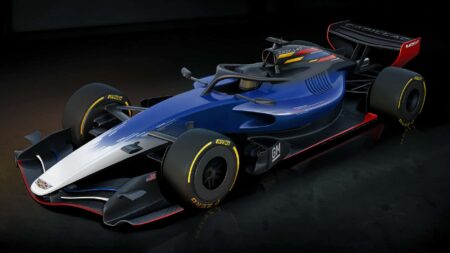
General Motors has pushed back its F1 entry as an engine supplier to 2029, but what does it mean?
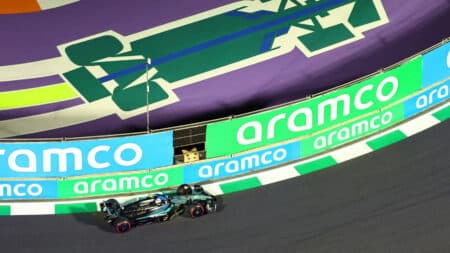
As Mercedes dropped down the F1 order in Saudi Arabia, team boss Toto Wolff found a hope in Kimi Antonelli's performance for the team
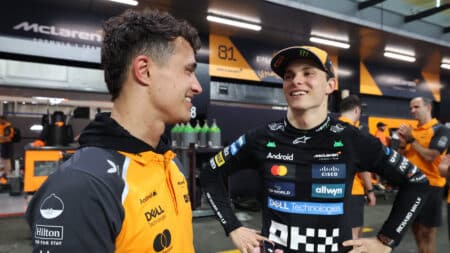
Zak Brown is still adamant on his approach that Lando Norris and Oscar Piastri are ‘number ones’ at McLaren. But how long will it be before history repeats itself and takes a sour turn?